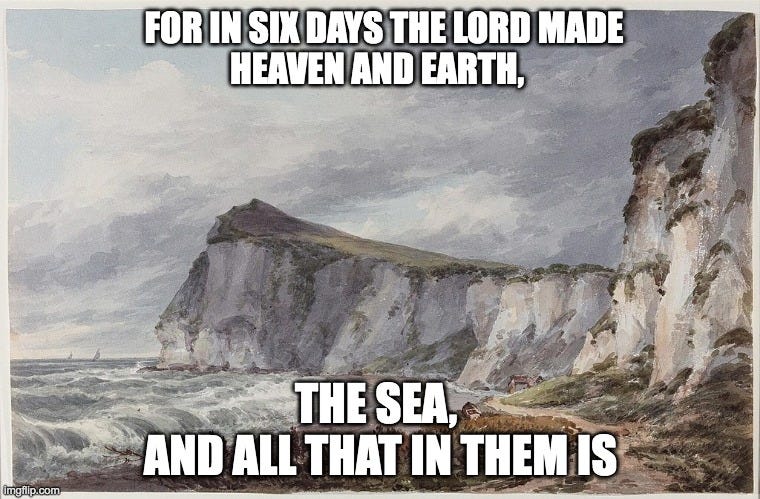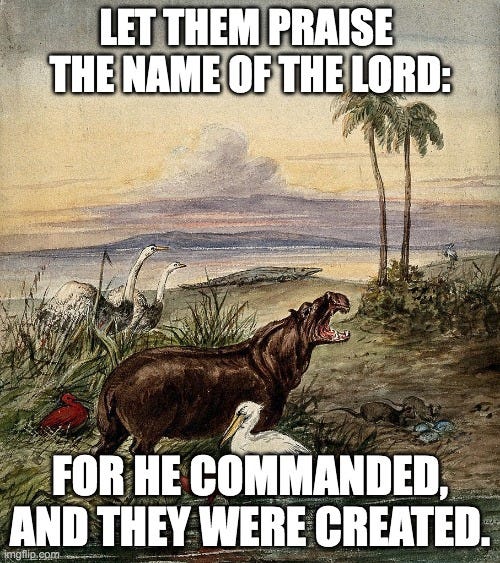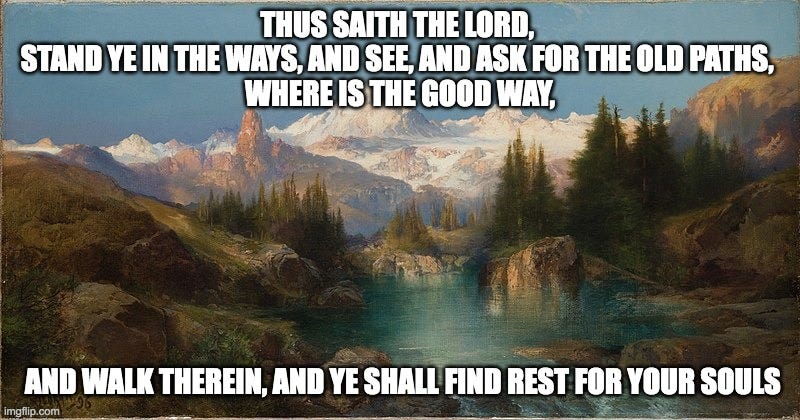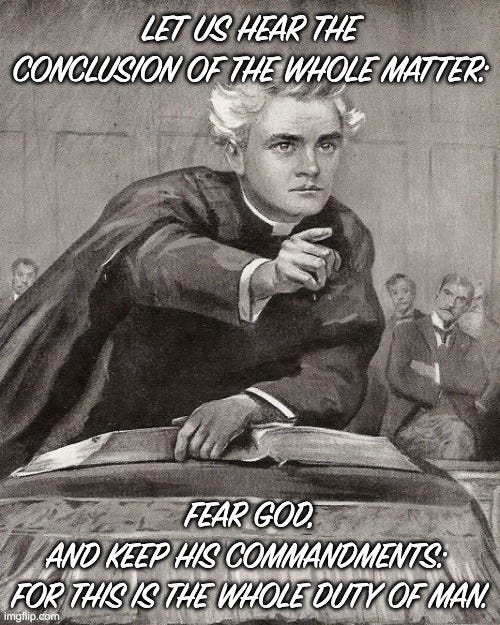When people stand around talking about various different ways of doing theology, one word that gets bandied around a lot is ‘literal’. One might be asked if one believes in a ‘literal’ resurrection, or a ‘literal’ virgin birth, or… a ‘literal’ six days.
There are two different issues here. One of them, and not the one I will deal with in this post, is direct. One is given a word, and one is asked if you think the ‘literal’ meaning of the word matches the meaning in the text. Thus when Christ says, “I am a door” one is asked about a frame and hinges and a knocker. You have one word, and one meaning, and one is asked if they correlate in this text.
That is NOT what I am addressing here. In looking at the issue of a ‘six day’ creation the question is often not whether one is is talking about a literal day vs a metaphorical day, but of one day vs a lot of days. One day vs an age. One day vs a really long time with a gap in the middle of its description.
What is a ‘day’?
So when we say ‘six day creation’, what are we talking about?
Twenty Four Hours?
Let me get everyone mad at me and say that I am NOT asking if the six days of creation were ‘twenty-four hour days’. I am not asking how many minutes or seconds they were. And there are several reasons for this:
Our current days are not twenty four hour days. The day I wrote this a certain website which measures such things said that that day was predicted to be: 23.9999997176 hours. It wasn’t even something they were sure of.
The Scriptures do not mention hours. Or minutes. Or seconds. They mention evening and morning.
And nothing in the Scriptures or science would even hint that the time in seconds and minutes of a modern day should correspond to the seconds and minutes of an ancient day, or a day pre-flood.
Now, before I am lynched by both sides….
Why ‘evening’ and ‘morning’?
That this was the first day's work, and a good day's work it was. The evening and the morning were the first day. The darkness of the evening was before the light of the morning, that it might serve for a foil to it, to set it off, and make it shine the brighter. This was not only the first day of the world, but the first day of the week. I observe it to the honour of that day, because the new world began on the first day of the week likewise, in the resurrection of Christ, as the light of the world, early in the morning. In him the day-spring from on high has visited the world; and happy are we, for ever happy, if that day-star arise in our hearts.
Matthew Henry, commentary on Genesis 1:5
Have you ever wondered why the Scriptures say ‘evening and morning’ when describing a day? I have seen some people say ‘That’s because that’s the way the Jews measure the day’, which I think is putting a rather large cart in front of a minuscule horse. I think it is the opposite.
And I think the creation story itself gives us the answer to this question.
We see here that the first of the two stages of light is ‘darkness’. It is only after darkness that light comes. This corresponds well with the idea of the ‘evening and morning’… evening being the time of darkness, and morning being the time when light comes. Evening and morning, one day.
The Word ‘Yom’
If you get into a real down and dirty discussion on the internet about the days of creation, it won’t be long before someone brings up the meaning of the word ‘yom’ in the first chapter of Genesis. Does it mean ‘day’ as in one rotation of the Earth? Or ‘age’ as in millions of years? Both? Neither?
Here are some of the meanings of the word ‘yom’ in Scripture:
The time something happened. Thus ‘In the day when Joe arrived at his home…”
The period where some thing happened. Thus “The day when Joe ruled.” This can be ‘during’ or ‘since’ or ‘until’.
The part of the day that isn’t night. Thus “Joe arrived home during the day”.
A period of time from Sunset to Sunset. “Joe will be here in two days”. (Note: typically this does not mean ‘in forty eight hours”, but ‘after two sunsets. Thus if you said it Monday afternoon, this would mean any time Wednesday before sunset.
Now for the average English speaker in practically every case where the word ‘day’ is translated from ‘yom’, there is no real question of what is meant. If a prophecy says, ‘In the day when the Gentiles return…” or somesuch, no one really wonders if this means ‘during the daylight’ or ‘during the period from sunset to sunset’. It means ‘The time something happened’.
And, conversely, when it says, “Thou shalt circumcise your child eight days after he is born,” no one really looks for eight ages, or the reign of eight kings.
So in the case of the ‘eight days’ of creation we have two linguistic clues as to the kind of ‘day’ it is. First of all, it has a number. First day, second day, etc. And everywhere in Scripture where a number is used, it is talking about an actual day… sunset to sunset.
Secondly, it has a description. And the description is that of… sunset to sunset. “And there was evening, and there was morning.”
Now, this word ‘yom’ is used 2295 times in the Old Testament, so I can’t exactly put them all in here (despite my penchant for putting in lots of verses); so I would, instead, encourage my readers to read through them.
What is a ‘year’?
I asked my seven-year old granddaughter what a ‘year’ was and she, along with a lot of people, gave a definition in months and days. But that is neither the Biblical nor the scientific definition of a ‘year’. A year is the amount of time it takes the Earth to go around the sun one time. Or, if you are using the common sense observational definition, the time it takes for the sun to complete one pattern in the sky, along with the corresponding change of seasons.
Contradictions
But this little incident has always lingered in my mind as a sort of parable. Most modern histories of mankind begin with the word evolution, and with a rather wordy exposition of evolution, for much the same reason that operated in this case. There is something slow and soothing and gradual about the word and even about the idea. As a matter of fact, it is not, touching these primary things, a very practical word or a very profitable idea. Nobody can imagine how nothing could turn into something. Nobody can get an inch nearer to it by explaining how something could turn into something else. It is really far more logical to start by saying ‘In the beginning God created heaven and earth’ even if you only mean ‘In the beginning some unthinkable power began some unthinkable process.’ For God is by its nature a name of mystery, and nobody ever supposed that man could imagine how a world was created any more than he could create one. But evolution really is mistaken for explanation. It has the fatal quality of leaving on many minds the impression that they do understand it and everything else; just as many of them live under a sort of illusion that they have read the Origin of Species.
GK Chesterton, The Everlasting Man
Now what this means is that if someone says that they think that the ‘days’ of creation were each thousands of ‘years’, that you have a contradiction in definitions going on. You literally are asking yourself, how many sunsets to sunsets are these days?
This contradiction becomes more apparent if you translate the various time words into their definitions. But it will become even more apparent if you look back and see what was actually going on during that ‘day’. So if one says, of the first day, that it took millions of years… then one needs to translate it thusly:
In the beginning God created the heaven and the earth.
And the earth was without form, and void; and darkness was upon the face of the deep. And the Spirit of God moved upon the face of the waters.
And God said, Let there be light: and there was light.
And God saw the light, that it was good: and God divided the light from the darkness.
And God called the light Day, and the darkness he called Night.
… and all of this happened while the Earth went around the Sun millions of times; until, at the end of some unknown number of millions of times, God decided to end this ‘day’.
So, without a sun, the Earth went around the sun millions of times? Without a sun, the Earth revolved around its axis millions of times?
Now let us get into the other ‘days’.
And God said, Let there be a firmament in the midst of the waters, and let it divide the waters from the waters.
And God made the firmament, and divided the waters which were under the firmament from the waters which were above the firmament: and it was so.
And God called the firmament Heaven.
… and this continued for millions of revolutions around a sun that didn’t exist yet?
On the third ‘day’, we have plants. Millions of revolutions with just plants. Nothing alive in the ocean (where the evolutionists insist that life began), just land plants.
On the fourth ‘day’, we finally get the sun and moon and stars. Millions and millions of revolutions around the sun before the sun existed. Millions of years of plants before the sun existed.
On the fifth ‘day’, no doubt over millions of revolutions around the at least it now exists sun, we get… ocean life and birds…
Then, on the ‘sixth’ day, we get everything else. Including man created before woman.
And yet millions more revolutions.
Of course, no one actually believes this. They do not merely translate the word ‘day’ into ‘age’ here, but they reorganize all of the things that were created, and how they were created. They replace, “And God said…” with “And blind evolutionary chance, operating over millions of years…”.
That Pesky Day
When we look at the ‘day’ of creation we need to remember that we are NOT comparing a ‘literal’ day with a ‘metaphorical’ day. When the Word of God is called a ‘light’, the issue really is one of a literal light, like might come out of a flashlight, versus a metaphorical ‘light’, meaning a method of learning knowledge, revealing truth or increasing wisdom.
However long the ‘day’ of creation was, on the other hand, it was a certain length. Certain things happened or didn’t happen on one given schedule or another. We are talking about a period of time, however long it was.
Dominoes
The contradiction between what the phrase ‘in six days’ could mean, and what the various commentators want it to mean does not stand alone. When we denigrate the text itself by forcing its meaning out of all recognition, we don’t just denigrate it in the one area, but in all areas. We will, in the end, show less and less value for the text everywhere.
The foundation of creation is this: God created everything else. The doctrine of creation divides the universe in two: God, and everything else. And the foundation of that belief is that He says so in His Word. If we begin doubting or denigrating or making excuses for His Word then doctrine after doctrine will fall.
Take Adam and Eve. If we cast doubt on six day creation, then where do Adam and Eve end up? If each ‘day’ is actually hundreds of thousands of days, then what do we do to the creation of Adam, the presentation of Eve, and their temptation and his fall? Was Adam created hundreds of rotations before Eve, and lived alone all of that time? What price then ‘be fruitful and multiply’?
And what of death? If instead of a six day ex-nihlo creation we have a millions of years evolution, then how does Adam become the author of sin and death? How many millions of humans lived before Adam? Were they sinless? Did they die?
Time and time again God, in Scripture, brings us back to the creation and demonstrates how His work in creation demonstrates both His attributes, and requires our response.
Praise the LORD
Praise ye the LORD. Praise ye the LORD from the heavens: praise him in the heights.
Praise ye him, all his angels: praise ye him, all his hosts.
Praise ye him, sun and moon: praise him, all ye stars of light.
Praise him, ye heavens of heavens, and ye waters that be above the heavens.
Let them praise the name of the LORD: for he commanded, and they were created.
He hath also stablished them for ever and ever: he hath made a decree which shall not pass.
Praise the LORD from the earth, ye dragons, and all deeps:
Fire, and hail; snow, and vapour; stormy wind fulfilling his word:
Mountains, and all hills; fruitful trees, and all cedars:
Beasts, and all cattle; creeping things, and flying fowl:
Kings of the earth, and all people; princes, and all judges of the earth:
Both young men, and maidens; old men, and children:
Let them praise the name of the LORD: for his name alone is excellent; his glory is above the earth and heaven.
Psalm 148:1-13
Equal to God
To whom then will ye liken me, or shall I be equal? saith the Holy One.
Lift up your eyes on high, and behold who hath created these things, that bringeth out their host by number: he calleth them all by names by the greatness of his might, for that he is strong in power; not one faileth.
Isaiah 40:25-26
Striving with the Creator
I form the light, and create darkness: I make peace, and create evil: I the LORD do all these things.
Drop down, ye heavens, from above, and let the skies pour down righteousness: let the earth open, and let them bring forth salvation, and let righteousness spring up together; I the LORD have created it.
Woe unto him that striveth with his Maker! Let the potsherd strive with the potsherds of the earth. Shall the clay say to him that fashioneth it, What makest thou? or thy work, He hath no hands?
Woe unto him that saith unto his father, What begettest thou? or to the woman, What hast thou brought forth?
Thus saith the LORD, the Holy One of Israel, and his Maker, Ask me of things to come concerning my sons, and concerning the work of my hands command ye me.
I have made the earth, and created man upon it: I, even my hands, have stretched out the heavens, and all their host have I commanded.
Isaiah 45:7-12
Conclusion
God created the heavens and the Earth in six days. He says so. Attempting to say anything else is just self-deception and will lead to destruction.
Thank you for reading Von’s Substack. I would love it if you commented! I love hearing from readers, especially critical comments. I would love to start more letter exchanges, so if there’s a subject you’re interested in, get writing and tag me!
Being ‘restacked’ and mentioned in ‘notes’ is very important for lesser-known stacks so… feel free! I’m semi-retired and write as a ministry (and for fun) so you don’t need to feel guilty you aren’t paying for anything, but if you enjoy my writing (even if you dramatically disagree with it), then restack, please! Or mention me in one of your own posts.
If I don’t write you back it is almost certain that I didn’t see it, so please feel free to comment and link to your post. Or if you just think I would be interested in your post!
If you get lost, check out my ‘Table of Contents’ which I try to keep up to date.
Thanks again, God Bless, Soli Deo gloria,
Von
Links
I have written several posts about Creation and Evolution.
and I were hoping for it to evolve into a letter exchange, but so far he has only commented.






